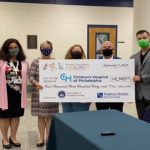PHOENIX – In 2016, Phoenix Children’s pediatric heart transplant center was the second busiest in the U.S., performing 24 heart transplants as reported by the Scientific Registry of Transplant Recipients (SRTR). This brings the program’s total to 67 transplants since its inception in 2011. The program has seen rapid growth with excellent outcomes.
With 58 active pediatric heart transplant programs in the country, Phoenix Children’s program proves its merit with a highly skilled clinical team going above and beyond to ensure successful organ matches. The SRTR informs that 88.9 percent of Phoenix Children’s patients awaiting heart transplants receive transplant within one year. Nationally, the average rate-to-transplant within one year is 55.4 percent.
“Having an effective transplant program is a testament to the resources we have at Phoenix Children’s and at other nearby institutions,” said Dr. Steven Zangwill, Medical Director of Transplantation at Phoenix Children’s. “Our program, while located in a region with somewhat smaller wait lists, tends to be more aggressive. We are willing to travel further for quality organs and we’ve implemented a very successful virtual transplantation system that allows us to expand the options for size matching. This allows us to virtually implant the available organ in question using advanced 3D imaging technology to assure that it’s a good size match.”
Phoenix Children’s heart transplant program also experiences growth from a strong referral program. Physicians from outside the network notice Phoenix Children’s consistent, positive outcomes, and refer patients from in and out of state. However, despite the program’s growing reputation, Phoenix Children’s team doesn’t solely focus on moving patients to transplant.
“Volume is not our goal,” said Dr. Zangwill. “We do our best not to go directly to transplant, and find alternative solutions when available. This past year we may have the second-highest volumes for heart transplants, but our real goal is providing the best care for the children and young adults we see with advanced heart failure, whether or not transplantation is their best option.”
Pheonix Children’s Heart Center Experts Available to discuss:
- Heart transplant volumes per patient age group
- Virtual transplantation system; measuring potential organs for transplant prior to surgery
- Mechanical circulatory support “Heartware” HVAD application in patients; bridging one teenaged patient to transplant using Heartware HVAD
- Greater-than-expected success of Phoenix Children’s pediatric heart transplant program
About Phoenix Children’s Hospital
Phoenix Children’s Hospital is Arizona’s only children’s hospital recognized by U.S. News & World Report’s Best Children’s Hospitals with rankings in all ten specialties. Phoenix Children’s provides world-class inpatient, outpatient, trauma, emergency and urgent care to children and families in Arizona and throughout the Southwest. As one of the largest children’s hospitals in the country, Phoenix Children’s provides care across more than 75 pediatric specialties. The Hospital is poised for continued growth in quality patient care, research and medical education. For more information about the hospital, visit www.phoenixchildrens.org.


